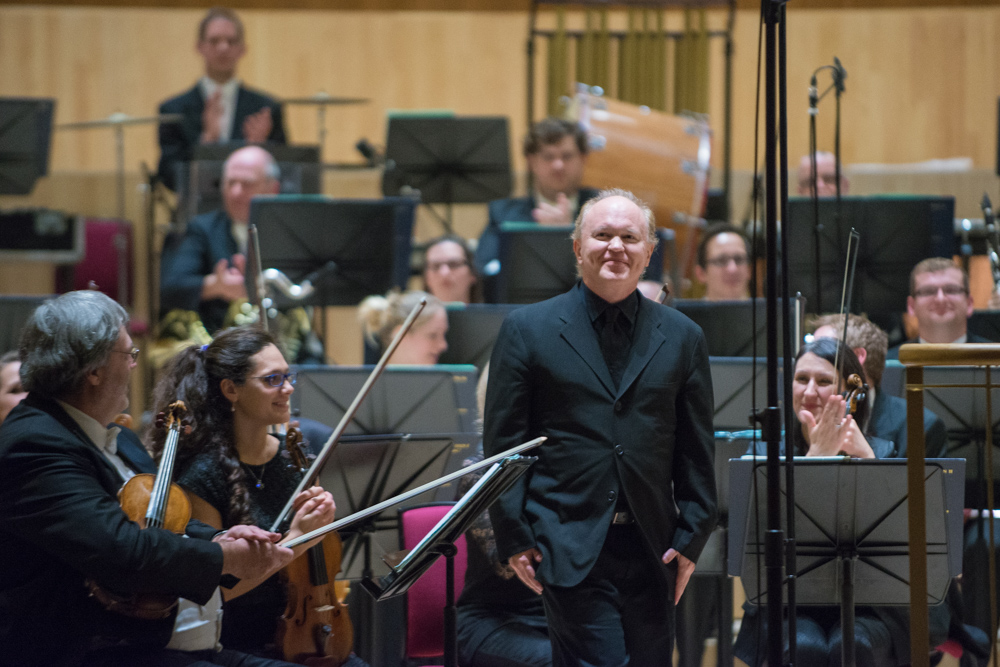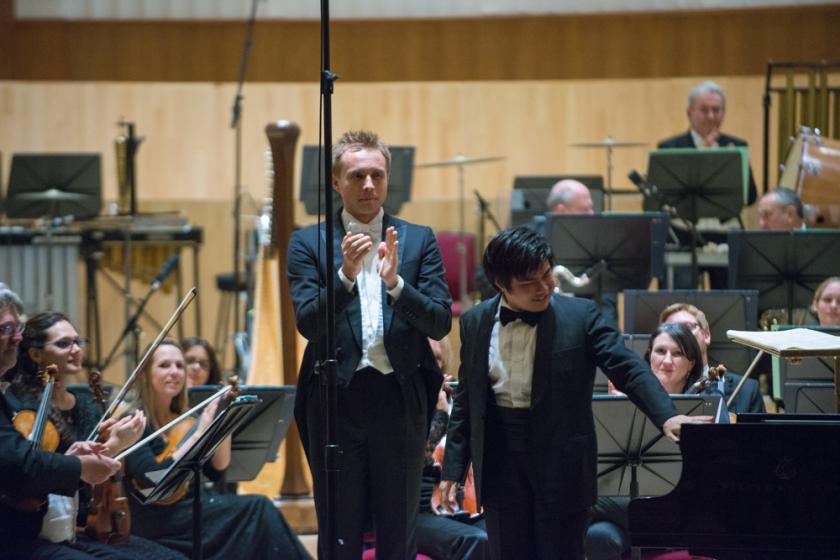The knots on the purse-strings have certainly been untied at the Royal Liverpool Philharmonic and it was good to hear another world première in less than a week. This time it was the turn of Michael Torke, the composer of Ecstatic Orange and Yellow Pages and a prolific composer of much else besides. But why this piece? There’s a bit of a connection with “Strawberry Fields Forever”, that iconic Beatles single, and his piece Tahiti was released on CD and recorded by the Royal Liverpool Philharmonic’s contemporary music outfit Ensemble 10/10.
The new Concerto for Orchestra was a single-movement piece in seven nominal movements. (Torke pictured taking a bow below) The mood was set at the very beginning: a trumpet solo of a falling fourth. Not that that is a bad start, but when it keeps recurring and gets worked to death in the course of 22 minutes, it does get a little wearing. The composer suggested this was a palette of colours, moods and speeds. No one could argue with that. Indeed, it was rather an attractive palette. Overall, whether in the fast movements, or in the Lento or Doloroso movements, there was still a rhythmic vitality, something which tugged at the attention and kept the audience if not on the edge of their seats, at least waiting to see what happened next.
 This was a lively piece, something which gave much to the orchestra and to which the Royal Liverpool Philharmonic, under chief conductor Vasily Petrenko, responded with some considerable gusto. Maybe the unrelenting fortissimo for the first couple of movements was a little much. Maybe the fact that this was a piece bereft of much contrapuntal invention could be a criticism. But maybe the fact that the audience really seemed to appreciate a new work – and the applause was enthusiastic, not just polite – might just be saying something. For this was a large-scale piece which was new, and which worked, and which players and audience liked. And what’s wrong with that?
This was a lively piece, something which gave much to the orchestra and to which the Royal Liverpool Philharmonic, under chief conductor Vasily Petrenko, responded with some considerable gusto. Maybe the unrelenting fortissimo for the first couple of movements was a little much. Maybe the fact that this was a piece bereft of much contrapuntal invention could be a criticism. But maybe the fact that the audience really seemed to appreciate a new work – and the applause was enthusiastic, not just polite – might just be saying something. For this was a large-scale piece which was new, and which worked, and which players and audience liked. And what’s wrong with that?
The pianist Nobuyuki Tsujii, blind since birth, joined the RLPO for Prokofiev’s Third Piano Concerto. In a way, this was something of a trial run, since he will be performing with the orchestra during their first tour of Japan in January. And there was something of a spark in this performance. There was a surging rhythmic vitality in the first movement which built up into the explosive cadence. The Andantino felt almost as if the orchestra was not there: this was a salon performance by the pianist: gentle, refined, intimate. But that was not to last. The final Allegro was ever pushing ahead. At times, it almost felt breathless, Petrenko and Tsujii almost cast as sparring partners. And yet, the soloist managed to bring in a variety of moods to the movement – sometimes delicate, sometimes sombre, but always postivie.
The exploration of Tchaikovsky symphonies continued in the second half, with a performance of the comparatively rarely heard First Symphony, Winter Daydreams. The insistence which built up through the first movement was underlined with some superb playing from horns and woodwind, a mood complemented in the second movement by delightful flute and oboe solos. A lively scherzo, where the detailed contrapuntal writing shone through, led into a playful finale which roused the audience – again – to a standing ovation.













Add comment